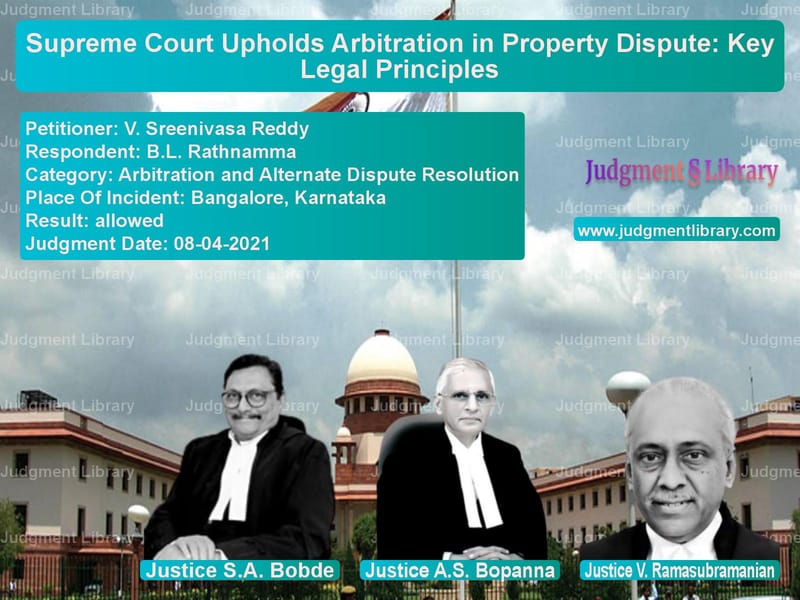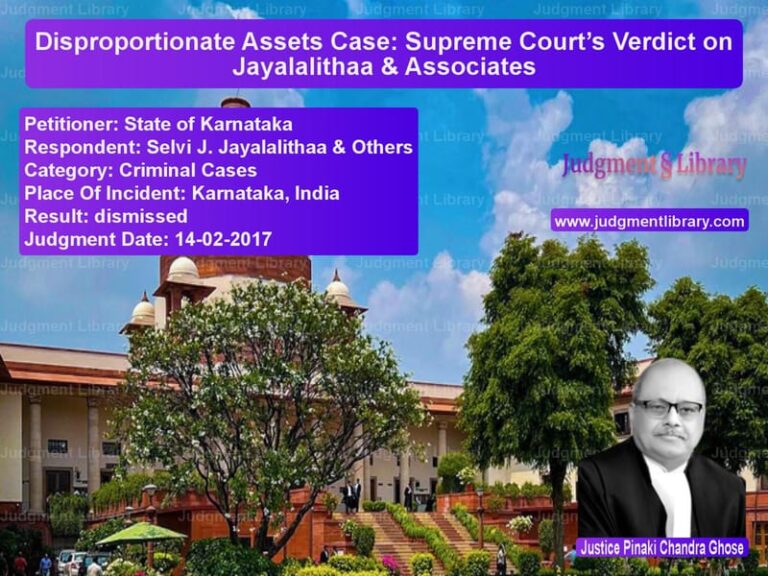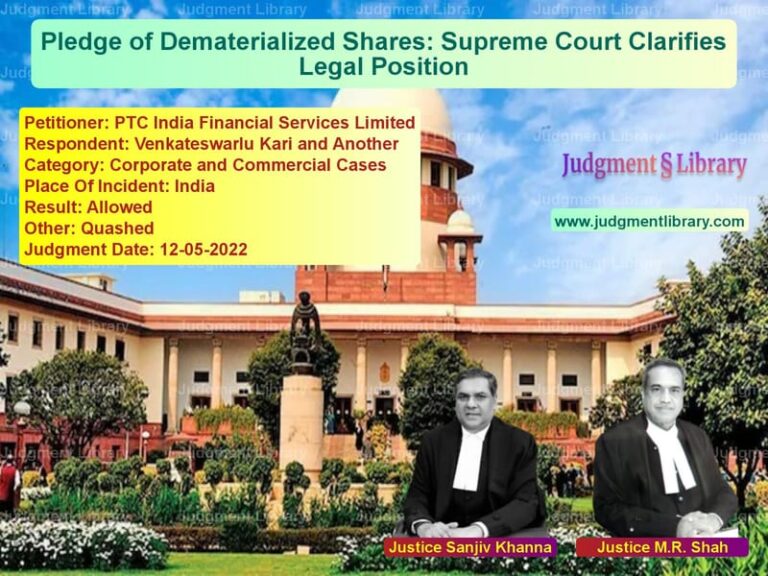Supreme Court Upholds Arbitration in Property Dispute: Key Legal Principles
The Supreme Court of India, in the case of V. Sreenivasa Reddy v. B.L. Rathnamma, ruled on a long-standing property dispute involving an agreement of sale that contained an arbitration clause. The judgment clarified important legal principles regarding arbitration agreements, novation of contracts, and judicial interference in arbitration proceedings.
Background of the Case
The dispute arose from an Agreement of Sale dated 23.03.2006, under which the appellant, V. Sreenivasa Reddy, agreed to purchase 19 acres and 1 gunta of land in Sathanur village, Bangalore North Taluk, from the respondent, B.L. Rathnamma, for a total sale consideration of Rs. 5.53 crore. The appellant paid Rs. 1.5 crore as an earnest money deposit, with the balance amount of Rs. 4.03 crore to be paid at the time of registration. The agreement included an arbitration clause (Clause 11) for resolving any disputes.
After the initial agreement, the respondent allegedly issued a letter on 09.02.2007, directing the appellant to complete the transaction. The appellant responded on 21.02.2007, raising certain objections. The respondent subsequently canceled the agreement on 17.04.2008, forfeiting the advance payment.
The appellant contested the cancellation and filed a petition under Section 11(6) of the Arbitration and Conciliation Act, 1996, before the Karnataka High Court, seeking the appointment of an arbitrator. The High Court initially dismissed the petition in 2011, stating that the matter had been settled out of court. However, no written settlement was recorded.
Key Issues Raised
- Whether the arbitration clause in the agreement of sale remained valid after the purported settlement.
- Whether a party could invoke arbitration despite a prior High Court ruling on settlement.
- Whether the withdrawal of the earlier petition with liberty to file afresh entitled the appellant to seek arbitration again.
- Whether the High Court of Hyderabad was justified in dismissing the fresh arbitration petition.
Arguments by the Appellant (V. Sreenivasa Reddy)
- “There was no written settlement agreement recorded, and hence, the dispute remained unresolved.”
- “The arbitration clause in the agreement of sale is still valid and binding on both parties.”
- “The Karnataka High Court merely recorded an oral submission of settlement and did not adjudicate the merits of the dispute.”
- “Since the previous petition was withdrawn with liberty to file afresh, the Hyderabad High Court should have entertained the arbitration application.”
Arguments by the Respondent (B.L. Rathnamma)
- “The matter was settled out of court, as recorded by the Karnataka High Court, and arbitration cannot be invoked now.”
- “The appellant voluntarily withdrew the earlier arbitration petition and cannot seek the same relief again.”
- “Once an agreement has been settled, the arbitration clause ceases to have effect.”
Supreme Court’s Observations and Ruling
1. Validity of the Arbitration Clause
- “An arbitration clause in a contract remains valid unless explicitly waived by both parties or superseded by a new agreement.”
- “The absence of a written settlement agreement means that the dispute was never conclusively resolved.”
2. Right to Seek Arbitration
- “The appellant’s right to invoke arbitration was not extinguished by the Karnataka High Court’s ruling, which merely recorded an oral settlement without an enforceable written agreement.”
- “The withdrawal of the earlier petition with liberty to file afresh allowed the appellant to pursue arbitration again.”
3. High Court’s Error in Dismissing Arbitration Petition
- “The Hyderabad High Court erroneously assumed that the matter had been settled, despite the lack of a recorded settlement agreement.”
- “Courts should not interfere with arbitration proceedings unless there is clear evidence that the dispute has been conclusively resolved outside arbitration.”
4. Appointment of an Arbitrator
- “Since the arbitration clause was still in force and the dispute had not been resolved, the Supreme Court exercised its power to appoint an arbitrator.”
- “Justice Ramesh Ranganathan, Former Chief Justice of the High Court of Uttarakhand, is appointed as the sole arbitrator to resolve the dispute.”
Supreme Court’s Judgment
The Supreme Court ruled in favor of the appellant and:
- Set aside the order of the Hyderabad High Court that dismissed the arbitration petition.
- Appointed a sole arbitrator to resolve the dispute.
- Directed that all contentions regarding the merits of the case be decided in arbitration.
Key Takeaways from the Judgment
- Arbitration agreements remain binding unless explicitly waived in writing or replaced by a new settlement agreement.
- Judicial intervention in arbitration matters should be minimal unless there is clear evidence that arbitration is no longer applicable.
- Oral settlements do not negate contractual arbitration clauses; a settlement must be in writing and enforceable.
- Withdrawal of a case with liberty to file afresh allows the claimant to pursue arbitration again.
Conclusion
The Supreme Court’s ruling in V. Sreenivasa Reddy v. B.L. Rathnamma is a significant reaffirmation of India’s arbitration framework. By upholding the validity of the arbitration clause and directing arbitration, the Court reinforced the principle that judicial intervention in arbitration should be limited. This case serves as a crucial precedent for future disputes involving arbitration agreements, particularly in property transactions.
Petitioner Name: V. Sreenivasa Reddy.Respondent Name: B.L. Rathnamma.Judgment By: Justice S.A. Bobde, Justice A.S. Bopanna, Justice V. Ramasubramanian.Place Of Incident: Bangalore, Karnataka.Judgment Date: 08-04-2021.
Don’t miss out on the full details! Download the complete judgment in PDF format below and gain valuable insights instantly!
Download Judgment: v.-sreenivasa-reddy-vs-b.l.-rathnamma-supreme-court-of-india-judgment-dated-08-04-2021.pdf
Directly Download Judgment: Directly download this Judgment
See all petitions in Arbitration Act
See all petitions in Dispute Resolution Mechanisms
See all petitions in Judgment by S. A. Bobde
See all petitions in Judgment by A. S. Bopanna
See all petitions in Judgment by V. Ramasubramanian
See all petitions in allowed
See all petitions in supreme court of India judgments April 2021
See all petitions in 2021 judgments
See all posts in Arbitration and Alternate Dispute Resolution Category
See all allowed petitions in Arbitration and Alternate Dispute Resolution Category
See all Dismissed petitions in Arbitration and Alternate Dispute Resolution Category
See all partially allowed petitions in Arbitration and Alternate Dispute Resolution Category







